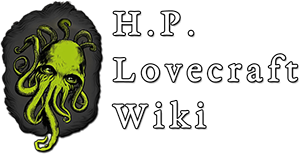![]() Supernatural Horror in Literature is an essay written by H. P. Lovecraft. It traces the history and development of "Supernatural Horror" and "Weird Literature", highlighting key writers and works. He goes over their faults as well as the things that make them unique and worth reading. In many cases, the things that Lovecraft mentions as being good or of high quality were those things he himself wished to better emulate in his own writing; the essay serves as a guidebook to the most important influences on Lovecraft's fiction.
Supernatural Horror in Literature is an essay written by H. P. Lovecraft. It traces the history and development of "Supernatural Horror" and "Weird Literature", highlighting key writers and works. He goes over their faults as well as the things that make them unique and worth reading. In many cases, the things that Lovecraft mentions as being good or of high quality were those things he himself wished to better emulate in his own writing; the essay serves as a guidebook to the most important influences on Lovecraft's fiction.
The essay was first published in August 1927 in the sole issue of the amateur press magazine The Recluse; portions of a revised and expanded version were published in The Fantasy Fan from 1933-35. The complete revised version appeared in the Arkham House collection The Outsider and Others in 1939.
Summary[]
While noting that "[c]osmic terror appears as an ingredient of the earliest folklore of all races," and can be traced through Classical and Medieval literature, the essay points to the Gothic novelist Horace Walpole--author of The Castle of Otranto—as "the actual founder of the literary horror-story as a permanent form" (though Lovecraft criticizes his writing as "tedious, artificial, and melodramatic").
The essay devotes a chapter to Edgar Allan Poe, calling him the author to whom "we owe the modern horror-story in its final and perfected state." A chapter on "The Weird Tradition in America" concentrates on Nathaniel Hawthorne and Ambrose Bierce--though also giving special mention to Lovecraft's friend Clark Ashton Smith. A final chapter on "The Modern Masters" singles out Arthur Machen, Algernon Blackwood, Lord Dunsany, and M. R. James.
Chapters[]
- I. Introduction
- II. The Dawn of the Horror-Tale
- III. The Early Gothic Novel
- IV. The Apex of Gothic Romance
- V. The Aftermath of Gothic Fiction
- VI. Spectral Literature on the Continent
- VII. Edgar Allan Poe
- VIII. The Weird Tradition in America
- IX. The Weird Tradition in the British Isles
- X. The Modern Masters
